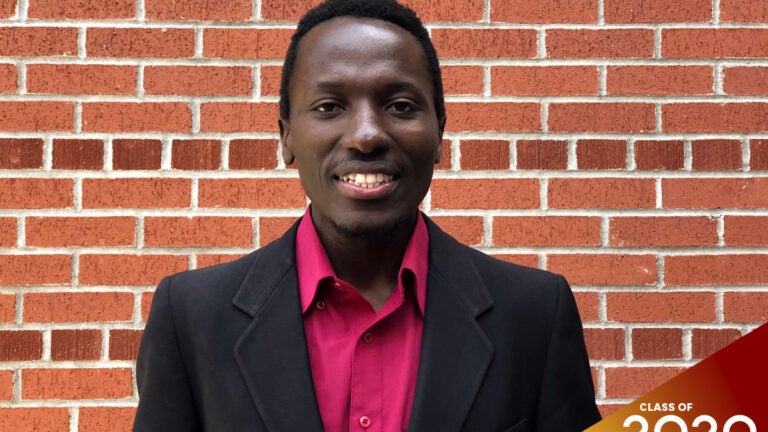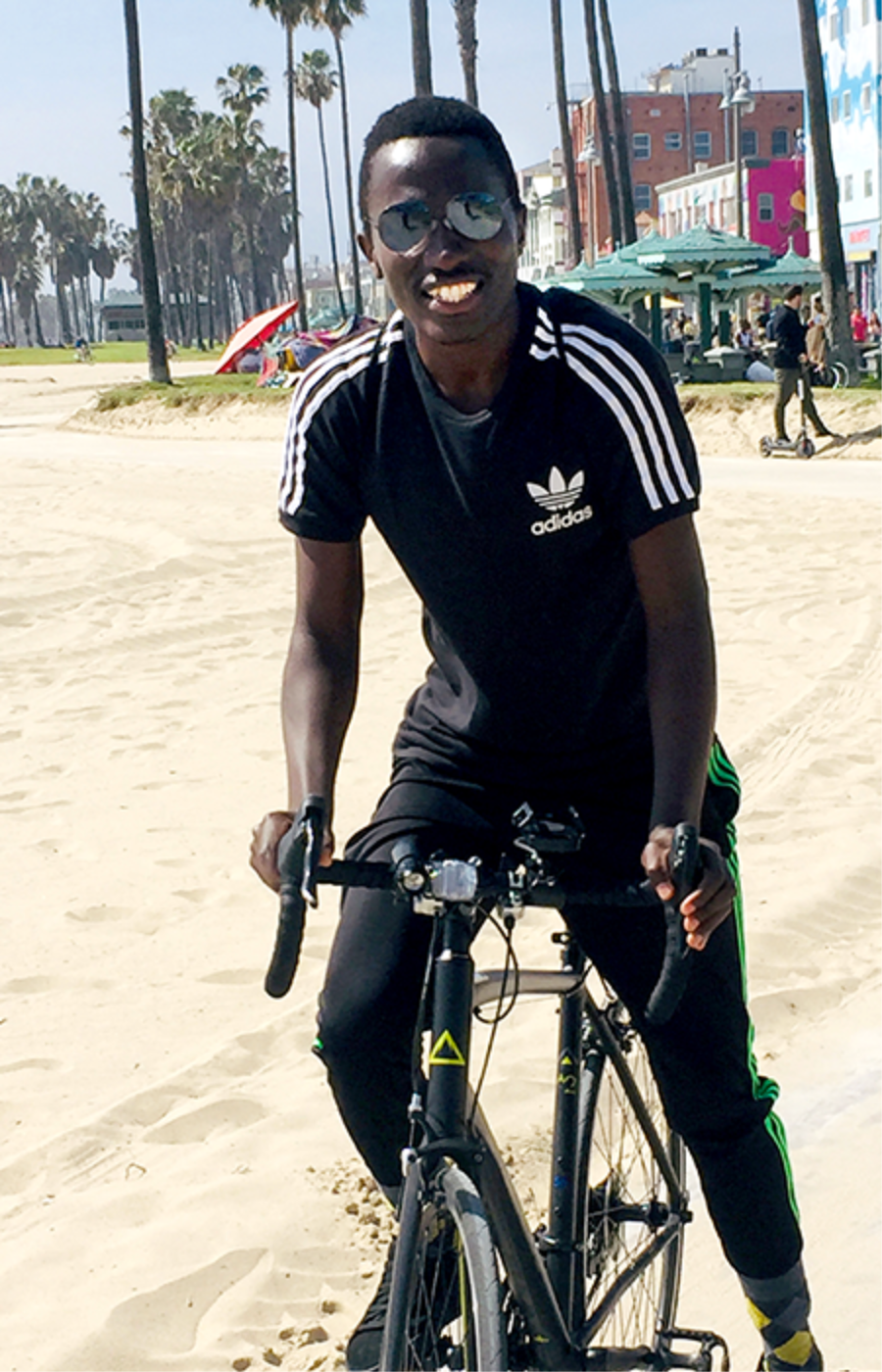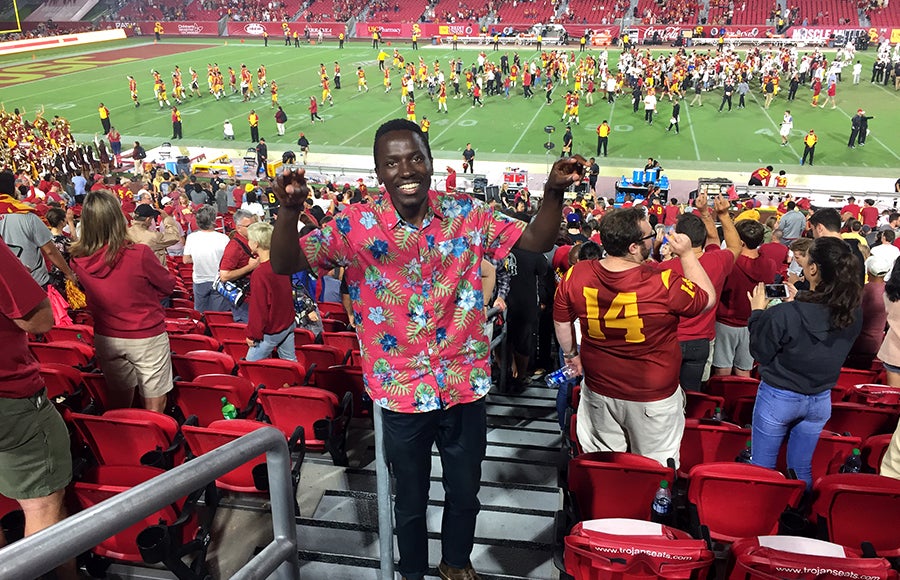
USC Dornsife Ph.D. graduate feels a responsibility to others
The seeds of Robert Nshimiyimana’s journey germinated out of ashes in his home country of Rwanda, where genocide resulted in the deaths of 800,000 people and nearly destroyed a nation in 1994.
As part of the nation’s slow rebuilding, the government created a Presidential Scholars Program to send top math and science high school graduates to a consortium of participating colleges in the United States. Nshimiyimana earned one of the few precious, competitive slots and traveled to Hendrix College in Central Arkansas, where he earned his bachelor’s degree in biochemistry and molecular biology with a minor in studio art.
Now completing his doctorate in organic chemistry at USC Dornsife College of Letters, Arts and Sciences, he is filled with gratitude and pride over how much he has achieved with the help of mentors and friends.
From farm to (lab) table
As a boy, Nshimiyimana told his mother he thought he might quit school, feeling content to tend sheep on the family farm.
“I just keep reminding her of that and thanking her,” he said, “because she told me, ‘Don’t think about it again because the sheep, they may not be there tomorrow, things happen, they could all die off from disease, somebody can steal them. So you cannot say that’s going to be a future.’”
From that day forward, Nshimiyimana set his sights on school. And just as college has forever transformed him, he has made an indelible impression on the Trojan community as a stellar student, researcher, mentor and volunteer.
The “go-to person”
Nshimiyimana was drawn to USC for its research reputation and location, and joined Professor of Chemistry and Pharmacology Nicos Petasis’ research group. The lab’s focus on synthesizing novel organic molecules that can lead to new pharmaceuticals or materials perfectly matched Nshimiyimana’s interests.

When it’s possible, Robert Nshimiyimana enjoys biking in sunny Southern California.
“I make organic compounds that are biologically active or important in medicinal applications,” he said. The researchers study the structure of molecules and try to understand how inflammation arises and recedes in the body. “It’s important because uncontrolled or excessive inflammation is a prominent component of many widely occurring chronic conditions, including vascular and neurological diseases, and thus is a big burden on health and the economy.”
Petasis said Nshimiyimana quickly became the “go-to person” for explaining new techniques and discussing various experimental skills. He got involved in chemical synthesis projects underway with collaborators at major medical research institutions including Harvard Medical School.
“Although this type of research is very challenging, Robert was able to master the delicate techniques and other aspects and emerged as the leading person in my group in this effort,” Petasis said. “He evolved as a superb graduate student and presented his research in multiple conferences, including oral presentations at national meetings.”
Volunteering from USC to Skid Row to Washington to Rwanda
Throughout his college career, Nshimiyimana has made a mark through caring about others.
Returning to Rwanda as an undergraduate summer intern, he designed and implemented a simple organic chemistry laboratory program at the University of Rwanda’s Kigali Institute of Science and Technology (now College of Sciences and Technology), where laboratory opportunities are in short supply.
As outgoing president of the 180-member USC Dornsife Chemistry Graduate Student Organization, he enjoys delivering simple pleasures such as ice cream socials and museum outings as well as professional development opportunities for his fellow students.
“It’s essential to create an environment where people can just talk about anything other than chemistry and work, and just relax,” he said.
Doctoral candidate Jaideep Singh calls him “truly passionate about improving graduate student life for us chemistry graduate students at USC.”
Nshimiyimana volunteers with off-campus interfaith groups to provide Thanksgiving meals, canned goods, clothing, blankets and hygiene products to the homeless in L.A.’s Skid Row. He also serves as a regional council member of Nothing But Nets, a grassroots group based in Washington, D.C., that raises awareness and funds to fight malaria and provides lifesaving mosquito nets in Sub-Saharan Africa and elsewhere. The work is personal: Nshimiyimana contracted malaria as a child.
“Helping others is really not just a voluntary thing, it feels like a responsibility,” he said. “Because that’s what I feel like we are all here for. I wouldn’t be here had my friends or family not been there for me. So I need to be there for others, as well.”
Optimism in the wake of an atrocity
Nshimiyimana was just 4 years old when Hutu nationalists took up arms against their Tutsi neighbors in what would become known as the Rwandan genocide. The genocide exacted a large mental and physical toll on his mother and three brothers, forever changing their lives.

Robert Nshimiyimana cheers the USC Trojans to football victory.
“It teaches me,” he said. “Literally everything was burned down to the ashes, like education, like all the infrastructure, so the country had to start from scratch, from square one.”
Now, as Rwanda moves ever closer to a post-tribal, unified future, Nshimiyimana remains confidently optimistic.
“Right now, we are the country of Rwanda. We are trying to move away from identifying ourselves as separate groups. I am a Rwandan and global citizen,” he said.
A future nation builder?
Nshimiyimana’s next destination is Boston, where he will undertake a postdoctoral position at Harvard Medical School and hospital affiliate Brigham and Women’s Hospital.
“This time around, I’ll be focusing on the biological application of the molecules in cells and also animals,” he said. He hopes to help reveal the structures of novel chemical signals and identify cellular targets that are important for overcoming inflammation, and to find their link to human disease.
One day, Nshimiyimana hopes to return to Rwanda and help the nation build its very own pharmaceutical capacity, addressing a call for effective, affordable and locally available medications.
“I see myself contributing in fields like drug discovery and development,” he said, “because in Rwanda and across Africa, the pharmaceutical industry is still in the inception phase in education and business development.”
“Whenever I go home, I see how things have really changed a lot for good. We have gone through hell and back, although it didn’t happen overnight. It’s been a continuing, laborious and rewarding process.”
The totality of his experiences, good and bad, remind him that people’s capacity for evil can be dwarfed by their capacity for good.
He finds truth and inspiration in a quote by Alfred Tennyson: “I am a part of all that I have met.”